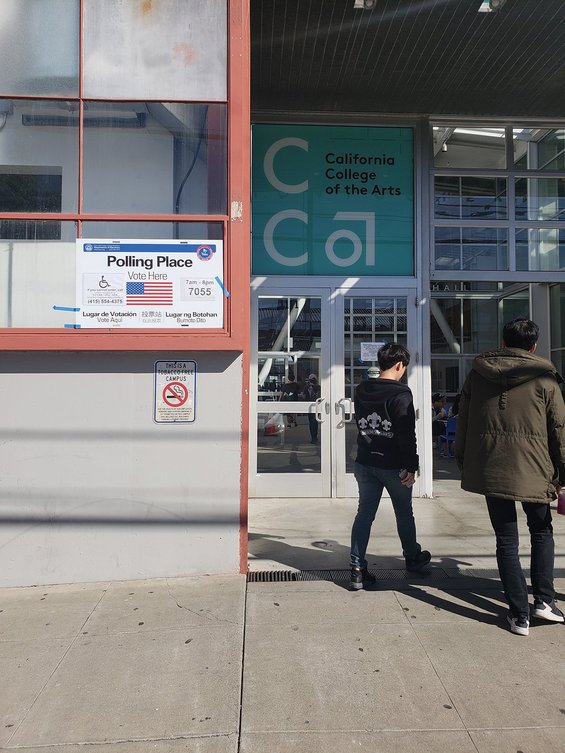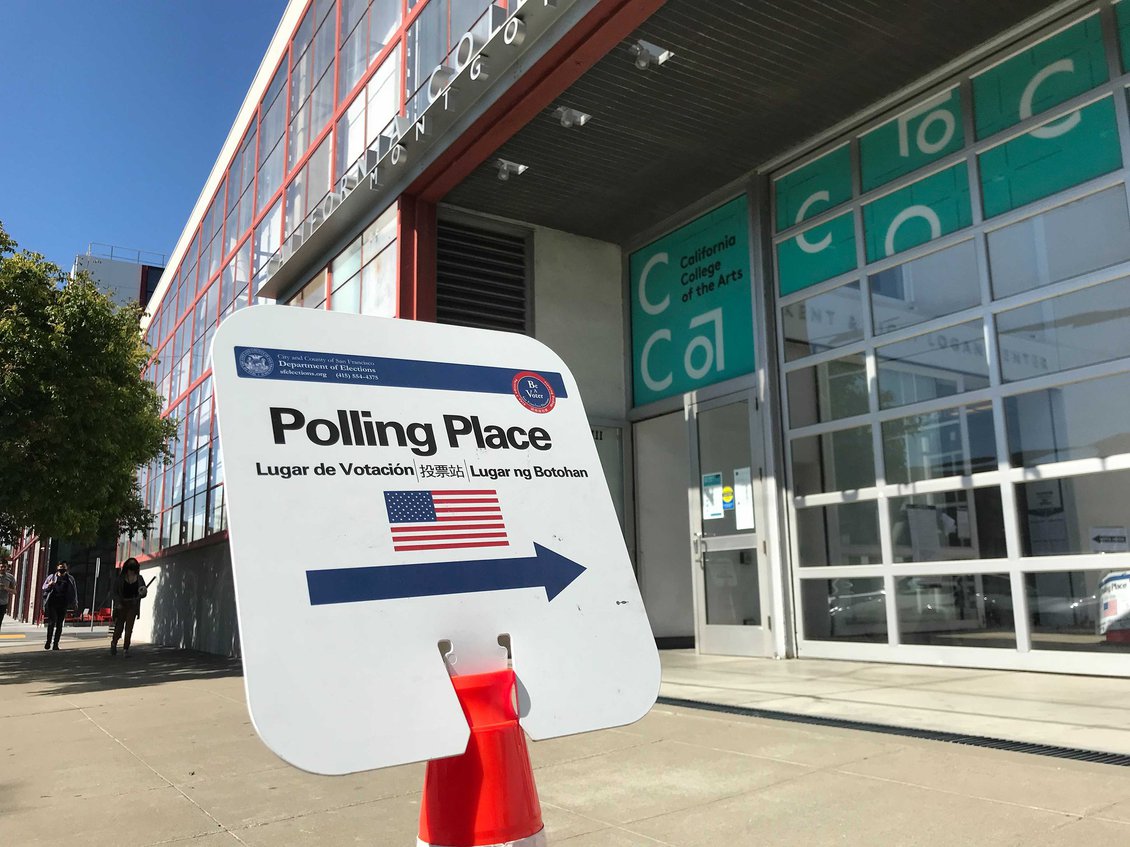Take Action
Only 65.6% of eligible CCA students voted in the 2020 Presidential Election. Among undergraduates, only 40% of eligible students (aged 18–21 years) turned out to vote. Let's work together to increase our community's democratic participation. Here's how you can take action.
Join CCA's Voting Coalition

CCA’s Voting Coalition is made up of staff, faculty, and students committed to increasing voter participation and democratic engagement on CCA’s campus. The Coalition meets monthly to coordinate efforts. Between meetings, work group members take lead roles to execute specific strategies. If you are interested in joining the team, please email vote@cca.edu.
Core Members:
- Jaime Austin (Committee Chair), Director of Exhibitions and Public Programming / Academic Affairs
- Bryndis Hafthorsdottir, Gallery Manager / Academic Affairs
- Adriana Lopez Lobovits, Director of the President's Office
- Noki Seekao, Senior Director of Campus Life / Student Affairs
- Stephaine Villanova, Assistant Director for Student Engagement, Activities, and Leadership / Student Affairs
The Voting Coalition enlists help and elicits feedback from staff, faculty, and students across the college. To become an advisory member of the Voting Coalition, please email vote@cca.edu.
Inspire Students to Vote
Faculty and staff play a vital role in promoting civic engagement among students, and helping them understand the issues that affect them. Below are suggestions for integrating voting into courses and helping to get out the vote.
- Apply for a CCA@CCA Faculty Grant to support election-related projects in your classroom
- Read Community Voting Organizer AnnMarie Giglio's open letter to students on why their votes matter
- List key election dates on your course syllabus or on Moodle. ALL IN has drafted sample language for syllabi and Moodle announcements in in their guide to Nonpartisan Messaging & Tools for Faculty and Academic Affairs.
- Give students 5–10 minutes in class to visit CCA’s Voting Resources page and make a voting plan or learn about the U.S. Election.
- Share key election dates by adding them to a slide at the start of your presentation deck
- Integrate the CCA@CCA Teaching Modules Why does voting matter? and/or What is your voting story? into your course plan
- Make arrangements so that no major assignments are due on Election Day or the day after
- Assign your class a CCA@CCA event to attend where they can learn about ballot issues
- Encourage students to help get out the vote using CCA’s custom Instagram GIFs or imagery from CCA's fall 2022 voting sticker design contest
- Add a line to your email signature encouraging others to vote, e.g. “Are you ready for the Presidential Election? Make a voting plan.” Link to CCA’s Voting Resources page
- Join CCA’s Voting Coalition to help to increase democratic engagement and civic education at CCA. Contact us at vote@cca.edu
Note: About 40% of CCA’s total student body is international or undocumented, and therefore ineligible to vote. When discussing elections, it is important to acknowledge this population and emphasize that U.S. election issues and results can have personal, bureaucratic, and global ramifications that affect them, too. All students can organize and mobilize their peers. View 5 Steps to Understanding U.S. Elections as an International Student.
Members of the CCA community participate in elections across the globe, including in India, the Republic of Korea, Taiwan, Mexico, and Canada. View election resources for international students.
Facilitate Conversations
Guidance
- Reframing Voting as a Collective, A Service to Others (Washington University in St. Louis Magazine)
- Guidance Against Normalizing Political Violence (Beyond Conflict)
- SIFT Method for Evaluating Resources and Misinformation (University of Chicago Library Guides)
- Facilitating Difficult Election Conversations (James Madison University)
- Teaching in Times of Strife & Trauma: Curated Resources with Actionable Ideas (Harvard Graduate School of Education)
- How can educators be ready to talk about politically charged topics in and beyond the classroom? (AAC&U)
Teaching Resources
- Conversation Guides on More Than 150 Topics (Living Room Conversations)
- How Faculty Can Continue to Keep Students Democratically Engaged (APSA)
- Voting Modules (Project Pericles)
- The Institute for Democracy & Higher Education’s library of research and resources (Tufts University) Note: Be sure to check out their “Making Sense of…” series, which offers overviews of hot topics, such as Federal Elections and the Supreme Court, plus reading recommendations and discussion questions for faculty to use in their classrooms.
Become a Poll Worker
Help make sure we have a safe, fair, efficient election for all voters by serving as a poll worker for the General Election. Prior to their service, Bay Area poll workers receive training and materials to make sure they are prepared to help voters on Election Day. U.S. citizens and legal permanent residents over the age of 18 who are registered to vote in California and who are able to complete the required training are eligible to apply to become poll workers.
San Francisco County
Poll workers arrive at their assigned polling place by 6am on Election Morning and end their day around 10pm. Upon completion of their Election Day assignment, San Francisco poll workers receive a stipend of $225 to $295. Apply now!
For more information on serving as a poll worker, or to apply to be an election worker in a California County not listed above, please visit the California Secretary of State website.

